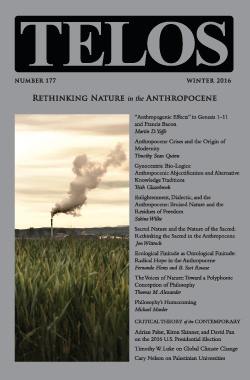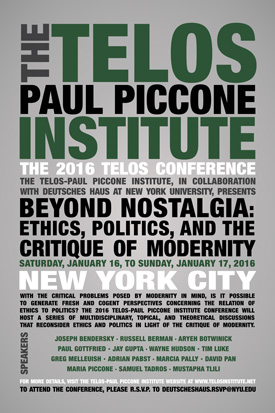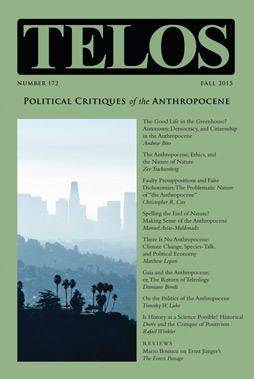By Ban Wang · Thursday, July 19, 2018 Ban Wang’s “Confucianism and Nature: Ecological Motifs in Kang Youwei’s Great Community” appears in Telos 183 (Summer 2018), our fiftieth anniversary issue. Read the full article at the Telos Online website, or purchase a print copy of the issue in our online store. Individual subscriptions to Telos are available in both print and online formats.
Environmental writers have been turning to Chinese traditions for a harmonious relation between humans and nature. However, treating environmental crises as a metaphysical meditation on how humanity as a whole stands over against nature ignores the critical examination of power relations in the equal relation of production, social hierarchy, and political oppression. As Max Horkheimer and Theodor Adorno declared, humanity’s domination of nature stems from the domination by some humans over others as well as over human nature. Environmental injustice is social injustice. From this immanent critique, Kang Youwei’s recapture of Confucian cosmology proves to be a critical resource. An influential thinker and reformer in the transition from the empire to a modern nation, Kang Youwei (1858–1927) wrote The Great World Community (Datong shu) and proposed to abolish all boundaries of nation-state, class, hierarchy, gender, and race, in hopes of bringing diverse peoples and nations into a cosmopolitan community. Ecological motifs could be recovered in Kang’s critique of oppressive social, political, and gender relations.
Continue reading →
By Wayne Hudson and Arran Gare · Tuesday, February 6, 2018 For a New Naturalism, edited by Arran Gare and Wayne Hudson, is now available from Telos Press in our online store. Order your copy today and save 20% on the list price by using the coupon code BOOKS20 during the checkout process.
Contemporary political and social theory needs to be rethought with reference to posthistorical conditions and developments in the natural sciences. More emphasis needs to be placed on a wider naturalism that goes beyond modern objectivating naturalism: a naturalism that opens up to both differential naturalisms and to differential humanities. In place of critique without concrete alternatives and American identity politics, a version of enlightenment is needed that stands for the rational reform of human affairs in all areas. This enlightenment is not the mainstream European Enlightenment of the eighteenth century. It is not hostile to indigenous and premodern social traditions, but seeks to learn from them. Nor is it confined to Western social thought or to a political thought based on the citizens of cities. This enlightenment engages with the sciences and with global historical dynamics.
Continue reading →
By Timothy Sean Quinn · Thursday, January 5, 2017 The term “Anthropocene” designates the present age of the world, dominated and transformed by human activity. It is therefore an age of crisis, whose central features include not only technological exploitation of the earth, but also a loss of faith in any order, natural or supernatural, that could serve as a guide to human affairs. In this essay, I wish to argue, first, that the roots of this crisis rest with the modern concept of nature, a concept of nature that, as Hans Jonas wrote, “contained manipulability at its theoretical core.”
Continue reading →
By Jon Wittrock and Richard Polt · Monday, December 12, 2016 Telos 177 (Winter 2016) is now available for purchase in our store.
 While the term Anthropocene was used in the USSR already in the 1960s to refer to the late Quaternary era, it rose to prominence more recently when introduced by Eugene F. Stoermer and Paul J. Crutzen. As the very word indicates, this is an epoch when humanity has taken center stage in the sense that its activities now have a major, global, and lethal impact. The shadow of human-caused global destruction and mass death haunts this epoch, and indeed, humanity’s newly acquired capacity for devastation is one of the Anthropocene’s most marked traits. While mass extinctions are hardly new phenomena and while the specter of the extinction of humanity due to some sudden catastrophe was there even before human beings were aware of it in scientific terms, the actual capacity of humanity to extinguish itself along with a large swath of other species on the planet is new, and the stakes of human action are higher. While the term Anthropocene was used in the USSR already in the 1960s to refer to the late Quaternary era, it rose to prominence more recently when introduced by Eugene F. Stoermer and Paul J. Crutzen. As the very word indicates, this is an epoch when humanity has taken center stage in the sense that its activities now have a major, global, and lethal impact. The shadow of human-caused global destruction and mass death haunts this epoch, and indeed, humanity’s newly acquired capacity for devastation is one of the Anthropocene’s most marked traits. While mass extinctions are hardly new phenomena and while the specter of the extinction of humanity due to some sudden catastrophe was there even before human beings were aware of it in scientific terms, the actual capacity of humanity to extinguish itself along with a large swath of other species on the planet is new, and the stakes of human action are higher.
Continue reading →
By Lukas Szrot · Monday, February 22, 2016 The following paper was presented at the 2016 Telos Conference, held on January 16–17, 2016, in New York City. For additional details about this and upcoming conferences, please visit the Telos-Paul Piccone Institute website.
 What is modernity? First, a period “occasioned by a peculiarly ahistorical view of the world, which is flattened into an eternal present. The world we experience appears to exhaust all possible worlds.” Second, modernity is deeply rooted in the three Kantian principles of Enlightenment: “‘What can know?’ the question of knowledge; of the ‘What should I do?’ which is the question of ethics, and of the ‘What can I hope?'” What is modernity? First, a period “occasioned by a peculiarly ahistorical view of the world, which is flattened into an eternal present. The world we experience appears to exhaust all possible worlds.” Second, modernity is deeply rooted in the three Kantian principles of Enlightenment: “‘What can know?’ the question of knowledge; of the ‘What should I do?’ which is the question of ethics, and of the ‘What can I hope?'”
The Western modern project is dependent upon both Greek and Hebrew antiquity. In ancient Ionia, Thales of Miletus predicted a solar eclipse, Anaximander predicted the changing of the seasons, Theodorus invented the ruler, the carpenter’s square, and the level, and Hippocrates began accumulating medical knowledge through trial and error. These “pre-Socratic” Ionians were merchants and artisans; they worked with their hands, whereas the Athenians were engaged primarily in contemplation.
Continue reading →
By Damiano Bondi · Thursday, October 15, 2015  The Gaia hypothesis was formulated for the first time in 1979 by James Lovelock. According to this conception, the Earth should be seen as a macro-organism whose purpose is to keep constant some conditions that are necessary for the presence of life on its surface. However—often with the consent of Lovelock himself—this scientific hypothesis has gone beyond its limits, transforming itself in a sort of anti-humanistic pseudo-religion: the Earth becomes a kind of divinity (Gaia) with a purposive will. This process of “personification” is quite paradoxical: Nature acquires features that are denied, at the same time, to the single man. In fact the human being, in this conceptual framework, is only a part of the Great Whole, the Mother Nature; he cannot be “her” guardian at all, he has to abandon any pretense of ontological superiority and to “believe” in the infinite potential of Gaia, who always finds a way to restore the threatened balance. On the ontological level, there is no difference between the single man and the natural ambient that surrounds him; so, on the moral level, this metaphysical conception ends to justify the indifference of the person to the impact of his own actions on the ecosystem. Not surprisingly, Lovelock has recently been deployed in favor of nuclear power. The Gaia hypothesis was formulated for the first time in 1979 by James Lovelock. According to this conception, the Earth should be seen as a macro-organism whose purpose is to keep constant some conditions that are necessary for the presence of life on its surface. However—often with the consent of Lovelock himself—this scientific hypothesis has gone beyond its limits, transforming itself in a sort of anti-humanistic pseudo-religion: the Earth becomes a kind of divinity (Gaia) with a purposive will. This process of “personification” is quite paradoxical: Nature acquires features that are denied, at the same time, to the single man. In fact the human being, in this conceptual framework, is only a part of the Great Whole, the Mother Nature; he cannot be “her” guardian at all, he has to abandon any pretense of ontological superiority and to “believe” in the infinite potential of Gaia, who always finds a way to restore the threatened balance. On the ontological level, there is no difference between the single man and the natural ambient that surrounds him; so, on the moral level, this metaphysical conception ends to justify the indifference of the person to the impact of his own actions on the ecosystem. Not surprisingly, Lovelock has recently been deployed in favor of nuclear power.
Continue reading →
|
|

 What is modernity? First, a period “occasioned by a peculiarly ahistorical view of the world, which is flattened into an eternal present. The world we experience appears to exhaust all possible worlds.” Second, modernity is deeply rooted in the three Kantian principles of Enlightenment: “‘What can know?’ the question of knowledge; of the ‘What should I do?’ which is the question of ethics, and of the ‘What can I hope?'”
What is modernity? First, a period “occasioned by a peculiarly ahistorical view of the world, which is flattened into an eternal present. The world we experience appears to exhaust all possible worlds.” Second, modernity is deeply rooted in the three Kantian principles of Enlightenment: “‘What can know?’ the question of knowledge; of the ‘What should I do?’ which is the question of ethics, and of the ‘What can I hope?'” 







